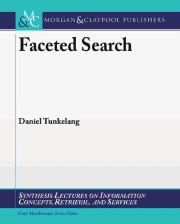29
May
I had somehow missed Jill Hurst-Wahl’s excellent article in this year’s Enterprise Search Sourcebook: An Info Pro’s Federated Search Pros and Cons. It was a brief post at Jill’s blog that brought the article to my attention.
The article, at only two pages, is a quick read but it gets to the heart of the question of whether your organization should consider federated search. Jill is clearly pro-federated search and her bias come across especially clearly in the article’s final paragraph:
What are your users doing? What should they be doing? If they are searching narrowly when they should be searching broadly, then you should consider using federated search. If they are missing information because they lack the patience to search multiple databases, then you should consider using federated search. And if your organization has the funding and personnel to implement federated search, then you should consider implementing a federated search solution.
Read the rest of this entry »
27
May
 Steve Jurvetson is a Managing Director of Draper Fisher Jurvetson, a leading venture capital firm. Jurvetson, at last week’s 11th annual Churchill Top Tech Trends event, spoke about a trend toward decentralized search which could dramatically change how many of us think about federated search. WebWare covered the event and discussed the trend:
Steve Jurvetson is a Managing Director of Draper Fisher Jurvetson, a leading venture capital firm. Jurvetson, at last week’s 11th annual Churchill Top Tech Trends event, spoke about a trend toward decentralized search which could dramatically change how many of us think about federated search. WebWare covered the event and discussed the trend:
Venture capital whiz-kid Steve Jurvetson gave an impassioned pitch for this trend, which he called, “The triumph of the distributed Web.” He said the aggregate power of distributed human activity will trump centralized control. His main point was that Google, and other search engines that analyze the Web and links, are much less useful than a (theoretical) search engine that knows not what people have linked to (as Google does), but rather what pages are open on people’s browsers at the moment that people are searching. “All the problems of search would be solved if search relevance was ranked by what browsers were displaying,” he said.
Jurvetson believes that the future is “federated search,” in which the Web’s users don’t just execute search queries, they participate in building the index by the very act of searching, immediately and directly.
Read the rest of this entry »
23
May
Recent versions of Firefox and Internet Explorer make it relatively straightforward for users to add search engines to their browser’s search menu if the search engine provider includes some OpenSearch magic in their site. I recently wrote about OpenSearch in relation to Yahoo! Alpha and this article shows a different way this technology is used.
Blog sponsor and federated search vendor Deep Web Technologies recently announced a set of browser search plugins for a number of major science search applications, including six federated search applications which are powered by Deep Web Technologies’ Explorit technology. Plugins were created for these applications:
Read the rest of this entry »
20
May
Nearly seven weeks ago I began my twitter experiment. I realized that I run into more federated search content on the Web than I have time to write about. It occurred to me that I could tweet all this good stuff. In this way I’d have an online record of these interesting URLs. At the same time, you’d all have articles to read if you felt inspired. I’m enjoying the tweeting so I’ll continue it.
I’ve tweeted nearly two web pages a day on average during the past 47 days. So, what have I tweeted? Here’s a sampling:
- An hour and 19 minute educational video about federated search from the Federal Library & Information Center Committee.
- A couple of interesting articles about Yahoo!’s move to “Kill the 10 blue links.” This one and this one. The move is part of a large evolution away from linear search results to results that are more interactive and discovery-oriented.
- Google providing limited support of RDFa to identify structured data on the Web.
- A nice introduction to the Invisible Web, including a bibliography of noteworthy sources.
- Stephen Arnold on why Wolfram Alpha is no threat to Google, in case any of you had any doubt.
- A content mining approach to building a better query.
- Federated or broadcast search, or what do we call this stuff? — from the Distant Librarian.
- Beyond federated search redux. More on the Summon discussion.
If you discover interesting articles, please tweet them to fedsearchblog and I’ll retweet them. And, if you like what I tweet, follow me on twitter.
18
May
Wolfram Alpha is live. For those of you who haven’t heard of Wolfram Alpha, it’s the very recently launched massive knowledge base from the makers of the premier mathematics program, Mathematica. It’s a massive computation engine but it’s not like any search engine you’ve ever seen. The best way to learn about it is to try some examples. Alpha’s visual gallery of examples is a good source of query ideas.
I think that Alpha is pretty cool and that what it does it does remarkably well. However, I think the Google generation isn’t going to like Alpha for some of the same reasons that they don’t like federated search; Alpha doesn’t offer instant gratification the way Google does. There’s actually a learning curve, something that Googlers are not used to. Plus Google always give you something interesting to read regardless of how badly you butcher your query. Not so with the narrowly focused federated search engines and definitely not so with Alpha.
Read the rest of this entry »
15
May
Ok, so this post is completely off-topic. I ran into this great web page with fun internet trivia so I thought I’d turn some of the items into questions and share them with all of you.
- Where did Google get its name?
- Where did Yahoo! get its name?
- In February 2004, what country led the world in Internet penetration, with 76.9 percent of people connected to the Internet?
- What is a ‘bastion host?’
- What are ‘browser safe colours?’
- It took 13 years for television to reach 50 million users. How long did it take the Internet to reach 50 million users?
- How many times per minute does the average computer user blink?
- What was the first computer company to register for a domain name?
- What is “6bone?”
- Domain registration was free until 1995. Who changed it?
Want more Internet trivia? Want the answers to these questions? Check out Complete Computer Solutions.
14
May
 Daniel Tunkelang, co-founder and Chief Scientist at Endeca, has written a book on faceted search. The book should be available for purchase sometime in June. A little bit of pre-release information is available at Daniel’s blog.
Daniel Tunkelang, co-founder and Chief Scientist at Endeca, has written a book on faceted search. The book should be available for purchase sometime in June. A little bit of pre-release information is available at Daniel’s blog.
Daniel was kind enough to send me a near-final draft of the manuscript to review.
If you don’t know what faceted search is or what its relevance is to federated search you may find this article to be helpful. Daniel Tunkelang is very passionate about finding ways to make information retrieval a more interactive endeavor. Faceted search is an important component of this interactivity. Here’s a salient piece of Daniel’s biography which I borrowed from his book:
Daniel is recognized as a leading advocate of Human Computer Information Retrieval, a multidisciplinary effort to bridge the gap between the more systems-oriented work in information retrieval and the more cognitively focused approach in library and information science. He has organized annual workshops on the subject. He publishes The Noisy Channel, a widely read and cited blog on the information seeking process. He also participates actively in both academic and industry conferences, recently attempting to bridge the gap between the two by organizing an Industry Track at SIGIR, the leading academic conference on information retrievals.
Read the rest of this entry »
11
May
The Las Vegas Clark County Library District staff blogged last month about their experience with a federated search application for kids. The library has a deployment of WebFeat with kid-friendly sources. The blog article explains that their first deployment didn’t appeal to teens (they preferred the adult WebFeat site) or to the elementary school students (they were overwhelmed with the number and subjects of the databases.)
Read the rest of this entry »
8
May
I wrote on Tuesday about those “things” that contain the content that your federated search application is searching. Several of you left comments and, while there’s no consensus from the vendor community, “source” seems to be in fairly common use.
Here’s another naming question. What is the difference between metasearch, federated search, and broadcast search? I know that I don’t have the full picture of how these names have been used historically and how they’ve evolved. A little while ago there was a discussion on code4lib. I believe it was Mike Taylor who launched the conversation with this question:
I, and most of the people I’ve worked with, have been using the terms “metasearch”, “federated search”, “broadcast search” and “distributed search” synonymously for years. Have they now settled down into having distinct meanings? If anyone could summarise, I’d be grateful.
Read the rest of this entry »
7
May
For those of you who enjoy Carl Grant’s popular articles on this blog you may be interested to know that Carl has been blogging at CARE Affiliates for some time. Last July, Carl returned to Ex Libris. It took a while but Carl is now continuing his blogging at the Ex Libris corporate site.
Read the rest of this entry »

 Daniel Tunkelang, co-founder and Chief Scientist at
Daniel Tunkelang, co-founder and Chief Scientist at 
